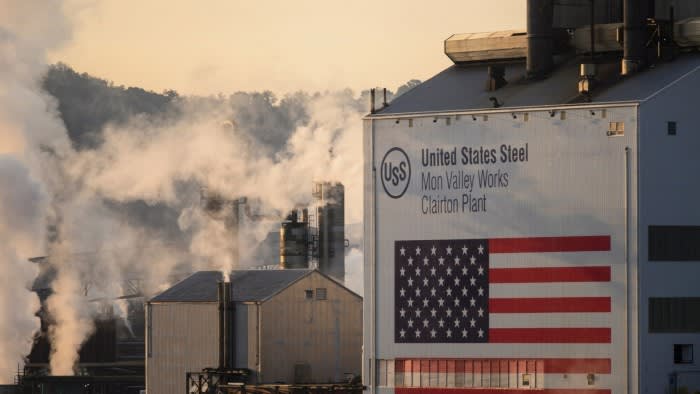Unlock the US Election Countdown newsletter for free
The stories that matter on money and politics in the race for the White House
Nippon Steel’s vice-chair will meet senior US officials in Washington on Wednesday in a last-ditch effort to salvage the Japanese group’s proposed $15bn acquisition of US Steel, which is opposed by Joe Biden and Kamala Harris.
People familiar with the situation said Takahiro Mori would meet several deputy cabinet secretaries involved with the Committee on Foreign Investment in the US, the Treasury-led inter-agency government panel that vets inbound investment deals for national security risks.
Treasury and Nippon Steel both declined to comment.
The deal has become an issue in the US presidential race because US Steel is headquartered in Pittsburgh, Pennsylvania, a critical swing state that vice-president Harris and former president Donald Trump are both hoping to win in November.
Earlier this month, Harris said the iconic steelmaker should remain “American owned and American operated”. Her statement mirrored the stance taken by President Biden who has said the transaction posed national security concerns. Trump has also said he would “immediately” block the acquisition if he returned to the White House.
Many experts, including some US officials who are privately frustrated with Biden’s approach, have dismissed the idea that a Japanese company buying US Steel poses a national security risk. Japan is the most critical US ally in the Indo-Pacific and the two countries are co-operating in many sensitive areas in their efforts to counter China.
Harris and Trump are trying to court the union vote in the industrial state ahead of the election, where US Steel last week warned thousands of jobs were “at risk” if Washington blocked the proposed acquisition. The United Steelworkers union opposes the deal.
The Financial Times last week reported Cfius had concluded the deal posed security risks that could not be mitigated by the Japanese company. Several people familiar with the deliberations said both the state department and the Pentagon did not agree with the conclusion. The two departments did not immediately comment.
Nippon Steel attempted to withdraw its filing with Cfius several weeks ago, with the intention of refiling its application after the election, said people familiar with the move. But Cfius, which must approve a withdrawal, did not respond to the company.
“A withdrawal that was timed to push it back past the election was viewed as a transparent play to put Biden in a vice,” said one Cfius expert, who said the committee had in the past not responded to similar requests when it “wanted to send a message”.
Several observers close to the situation said they were watching closely to see if the issue would come up when Harris and Trump hold their debate on Tuesday night — particularly because the event is being held in Philadelphia in Pennsylvania.
The administration’s approach has frustrated Tokyo, particularly because it comes as the US presses Japan to co-operate in other security-related areas, including tightening export controls to make it harder for China to develop advanced semiconductors.
“The Biden administration talks frequently about the importance of solidarity with allies, but this decision flies in the face of those promises,” said Zack Cooper, an Asia expert at the American Enterprise Institute. “This should have been a case of friendshoring in action, but instead we have punched one of our best partners on economic security right in the face.”



